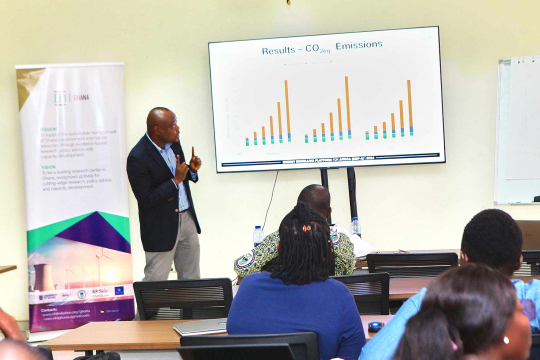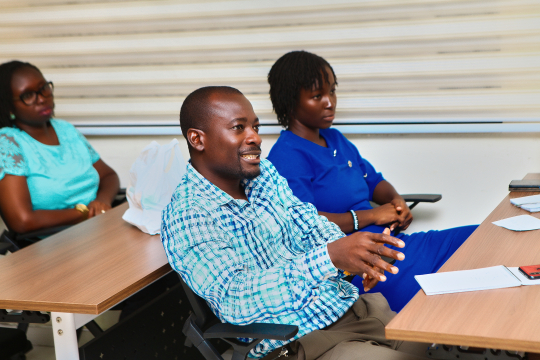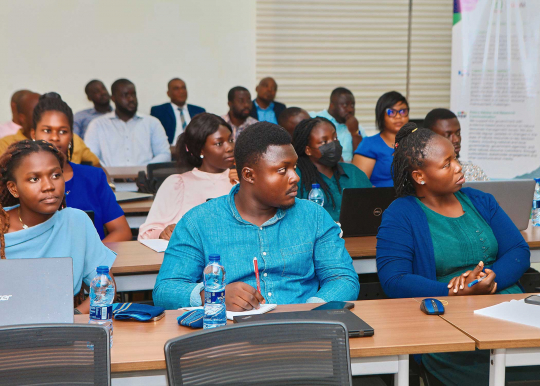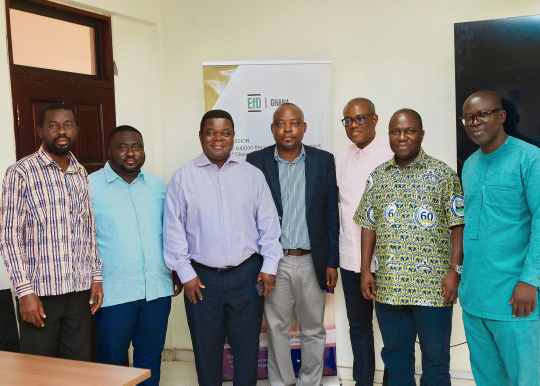EfD Ghana organized a training session for students and early career researchers aiming to build their capacity on the Climate, Land, Energy, and Water Systems (CLEWS) framework. Titled Exploring the CLEWS for Upscaling of Clean Energy in Ghana, the workshop involved participants from the University of Ghana (UG), the Ghana Institute of Management and Public Administration (GIMPA), and the University of Environment and Sustainable Development (UESD).
The primary objective of the workshop was to equip participants with the knowledge and resources needed to build their capacity in the CLEWS framework, which integrates assessments of energy, land use, and water systems. This model allows for simultaneous analysis of the interlinkages of these elements, their impacts on and vulnerability to climate change. It employs OSeMOSYS, a bottom-up cost-based linear programming approach to determine the optimal minimum cost for an appropriate CLEWS model under given constraints.
EfD Ghana Director, Wisdom Akpalu, opened the session by welcoming participants and giving an overview of EfD Ghana, explaining its mission, activities, and achievements in research, capacity development, and policy advocacy. Francis Atsu, facilitated the training, presenting a CLEWS model for Ghana which was developed in collaboration with a team from the Energy Commission. This model provides insights into the challenges and opportunities in Ghana’s pursuit of sustainable resource utilization in the face of climate change.
Participants shared their reflections on the workshop, highlighting its impact on their academic and professional paths. Gershon Agbledzorwu, a doctoral student at GIMPA, found the seminar very useful, stating, "The process of conceptualization behind the CLEWS model was insightful and it will help me in the choice of appropriate models to implement. It also broadened my understanding of issues concerning climate and environmental sustainability."
Gifty Samani, a BSc. Energy Sustainability student at UESD appreciated the comprehensive viewpoint offered by the training. She remarked, "This knowledge is especially helpful for my academic path; it gives me a comprehensive viewpoint that helps me examine problems and come up with creative ideas to deal with Ghana's complex clean energy implementation hurdles."
Reginald Dzonu-Ahlijah from GIMPA also valued the training, stating, "The training provided more practical insights on the relevant factors impacting the Environment, Sustainability and Governance (ESG) framework and SDG variables in light of the CLEWS framework."
Stephanie Kwansema Danquah, a Principal Research Assistant at the Institute of Statistical, Social and Economic Research (ISSER), UG praised the workshop for its interactive nature, saying, "The interactive process allowed me to get a better understanding of the CLEWS nexus. As advised by the facilitator, I will subscribe to the online training sessions on CLEWS and other climate courses which will boost my research journey in environment and climate change."
The workshop, held at the ISSER conference center at the University of Ghana on 31 July, is part of EfD Ghana's broader commitment to building research capacity and fostering knowledge exchange. This training equipped participants with valuable insights and tools to address the complex challenges of climate change and sustainable resource management in Ghana. The CLEWS framework, as presented in this training, promises to be a crucial component in the country's efforts towards achieving sustainable development goals.
By: Vicentia Quartey



